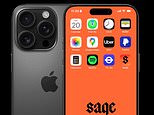Science
New ‘Dumb’ iPhone Launches to Combat Smartphone Addiction

A new device targeting smartphone addiction has been launched by American technology firm Techless in the United Kingdom. The Sage phone, a modified version of the iPhone 16, eliminates access to the internet, games, and popular social media apps, aiming to help users reduce their screen time significantly.
The Sage phone, which officially launched on July 17, 2025, is positioned as a tool for both children and adults striving to reclaim their time from digital distractions. Starting at £99.95 per month, the pricing is notably higher than standard two-year contracts for traditional smartphones, more than double the typical cost. Despite its price, Techless emphasizes that the device is designed to facilitate a healthier relationship with technology.
What Makes the Sage Phone Unique
The Sage phone is built on a framework of digital wellbeing, offering a “sleek, secure alternative” to conventional smartphones. It includes essential applications such as Phone, Messages, Maps, Calendar, Calculator, and music services like Spotify, but it does not allow downloads of addictive platforms like WhatsApp, TikTok, or Instagram. This is intended to promote a simplified digital experience that encourages users to engage more with the physical world around them.
According to Chris Kaspar, CEO and founder of Techless, the company’s objective was to avoid creating a device that merely functions as a parental control tool. “We wanted to build a device that’s safe by design, not safe by surveillance,” Kaspar stated. He noted that the Sage phone is aimed at helping people reconnect with real life rather than simply reducing screen time.
The device is available in two models: the iPhone 16e and the iPhone 16 Pro, both equipped with Sage’s custom software. While it restricts access to potentially harmful apps, it allows users to communicate and navigate their surroundings effectively.
Addressing Smartphone Addiction
The launch of the Sage phone coincides with rising concerns regarding online safety and mental health related to excessive smartphone use among children and teenagers. A report from the National Society for the Prevention of Cruelty to Children (NSPCC) indicated that over 7,000 online grooming incidents were recorded in the UK within a single year, primarily affecting individuals aged 12 to 15. Studies have linked heavy smartphone use to mental health issues such as depression and anxiety, emphasizing the need for solutions like the Sage phone.
While the term “smartphone addiction” is not officially recognized as a separate mental health condition, it has gained traction in discussions about technology use. Research suggests that approximately 25% of the global population may experience problematic smartphone use, with figures potentially reaching 70% in certain countries. Experts highlight that distinguishing between problematic use and true addiction is essential, as not all excessive use leads to dependency.
By encouraging users to focus on essential functionalities, the Sage phone seeks to provide a form of rebellion against the overwhelming nature of constant digital engagement. As the device rolls out for pre-order in the UK, with shipping expected the week of August 25, 2025, it could reshape how families approach smartphone usage in an increasingly connected world.
-

 World1 day ago
World1 day agoCoronation Street’s Shocking Murder Twist Reveals Family Secrets
-

 Entertainment4 months ago
Entertainment4 months agoKate Garraway Sells £2 Million Home Amid Financial Struggles
-

 Entertainment3 months ago
Entertainment3 months agoAnn Ming Reflects on ITV’s ‘I Fought the Law’ Drama
-

 Health3 months ago
Health3 months agoKatie Price Faces New Health Concerns After Cancer Symptoms Resurface
-

 Entertainment3 weeks ago
Entertainment3 weeks agoCoronation Street Fans React as Todd Faces Heartbreaking Choice
-

 World3 weeks ago
World3 weeks agoBailey Announces Heartbreaking Split from Rebecca After Reunion
-

 World4 days ago
World4 days agoKevin Sinfield Exceeds Fundraising Goal Ahead of Final Marathons
-

 Entertainment3 months ago
Entertainment3 months agoCoronation Street’s Carl Webster Faces Trouble with New Affairs
-

 Entertainment4 days ago
Entertainment4 days agoTwo Stars Evicted from I’m A Celebrity Just Days Before Finale
-

 Entertainment3 months ago
Entertainment3 months agoWhere is Tinder Swindler Simon Leviev? Latest Updates Revealed
-

 Entertainment4 months ago
Entertainment4 months agoMarkiplier Addresses AI Controversy During Livestream Response
-

 Science2 months ago
Science2 months agoBrian Cox Addresses Claims of Alien Probe in 3I/ATLAS Discovery





















